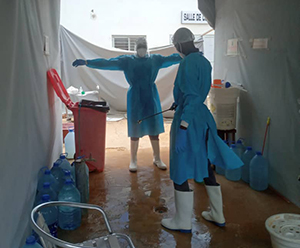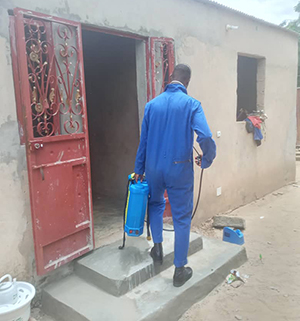Building Capacity for COVID-19 Decontamination in Senegal
To read this article in French, please click here.

Decontamination of community health workers during PPE removal. Photo credit: Mame Mbaye/MTaPS
When COVID-19 hit Senegal in late February 2020, the government took aggressive measures to contain the spread of the pandemic. However, the country needed support to develop comprehensive measures for infection prevention and control (IPC), including decontaminating and disinfecting places where positive COVID-19 cases were present.
As indicated by the CDC, the principal mode of transmission of SARS-CoV-2 virus is by respiratory droplets, but people can also get infected by touching a contaminated surface and then touching their own eyes, nose, or mouth. As a result, disinfecting places can reduce the risk of spreading infection by eliminating germs on frequently used surfaces.
To support the Ministry of Health and Social Action of Senegal, the USAID Medicines, Technologies, and Pharmaceutical Services (MTaPS) Program collaborated with partners such as UNICEF to strengthen the country’s capacities for disinfection and decontamination of health care and non-health care facilities.
This work was provided by MTaPS under the larger scope of COVID-19 response support to Senegal to rapidly assess and strengthen IPC capacity at health facilities. The response leveraged the program’s ongoing Global Health Security Agenda activities in the country.
A comprehensive response to decontamination challenges

Decontamination activity in Mekhe (Thiès region). Photo credit: Mame Mbaye/MTaPS
MTaPS started by supporting the standardization and adaptation of two monitoring tools, one for the decontamination of treatment centers and one for the decontamination of households and non-hospital facilities. During this process, MTaPS enhanced the tools to better track the decontamination steps, safety of procedures, and tracking of proper use and quantities of decontamination products.
In addition to developing and ensuring that the tools were approved, MTaPS worked with the National Hygiene Service (SNH) and the Regional Hygiene Brigades (BRH) of Dakar, Thiès, and Diourbel—three of the most affected regions—to train staff on decontamination measures so they could start working in the three regions’ health facilities, communities, and households. MTaPS supported the SNH and the BRH by developing terms of reference for disinfection and decontamination operations and establishing a training strategy including a mix of face-to-face and virtual training to ensure the safety of health agents. These trainings included biowaste management, donning and doffing personal protective equipment (PPE), and hand washing. In total, 54 agents in Dakar, 12 in Diourbel, and 12 in Thiès received the training.
Following this training, the agents were then deployed in the field to perform the decontamination work.
A support that enabled strong and immediate results
Between August and September 2020, 985 decontamination and disinfection sessions were carried out, including 859 in Dakar, 99 in Thiès, and 27 in Diourbel. Intervention sites included homes with confirmed or suspected COVID-19 cases, morgues, mosques, and health care facilities with a priority focus on isolation rooms.
To minimize stigmatization of households and families visited during the sessions, MTaPS, the BRH, and SNH also carried out communications campaigns on COVID-19 and to promote recommended behaviors for individuals, families, and groups. They included local awareness campaigns, and some decontamination sessions were performed at night at the request of the families at risk of stigmatization.
The Ministry of Health and Social Action, MTaPS, and all stakeholders involved noted the importance of coupling decontamination operations with the local awareness campaigns about COVID-19 to promote recommended behaviors and correct misconceptions. Sensitivity to the risk of stigma was essential for securing families’ participation.
“Thiès suffers from a lack of human resources, with one agent for 60,000 inhabitants, and huge needs in terms of hygiene. The capacity building support provided by MTaPS in infection prevention and control was very beneficial. We want to thank UNICEF, MTaPS, and our hierarchy for all their efforts. With these new skills and knowledge, we’ll be more productive and can reach the objectives of the Ministry of Health and Social Action to contain the pandemic.” Captain Idrissa Ndiaye, head of the Regional Hygiene Brigade in Thiès